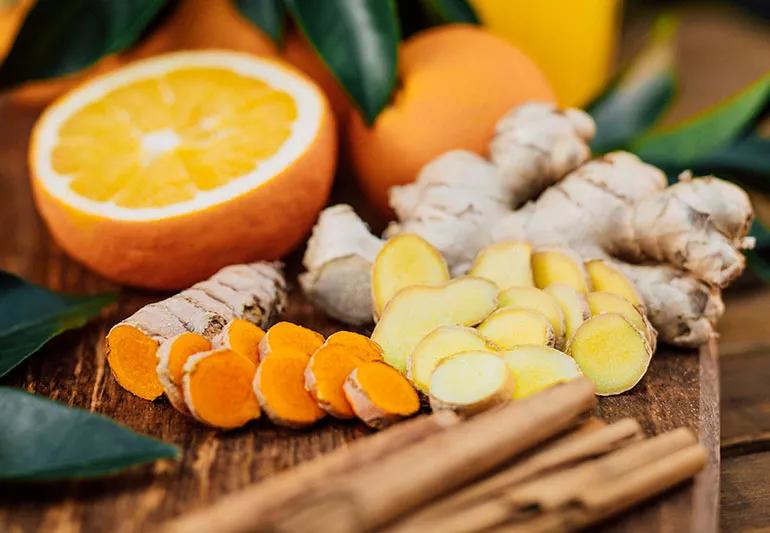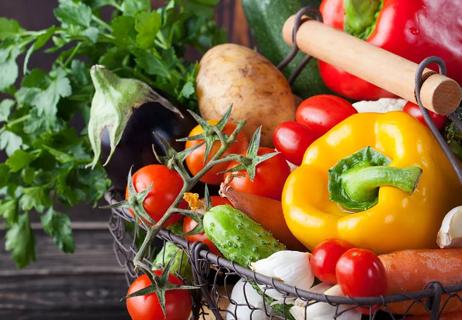Adding these simple foods to your diet can make a big difference

Food is medicine. If you’re struggling with pain from arthritis, eating foods that have antioxidant, anti-inflammatory and analgesic properties — along with any drugs or other treatments your doctor recommends — may help.
Advertisement
Cleveland Clinic is a non-profit academic medical center. Advertising on our site helps support our mission. We do not endorse non-Cleveland Clinic products or services. Policy
“Research is ongoing, but scientists already have found that certain foods may reduce arthritis-related inflammation and pain,” says registered dietitian Andrea Dunn, RD, LD, CDE.
Here are 10 foods that Dunn recommends for a diet that may help ease your arthritis pain and improve your heart health:
Green tea is known to be high in nutrients and antioxidants and has the ability to reduce inflammation, says Dunn. Studies performed on animals also found that it can help reduce the incidence and severity of rheumatoid arthritis.
“To reap the benefits, aim for two servings a day, either hot or cold,” Dunn notes. “Be sure to use tea bags and not the powdered tea mixes, which are more processed. If you drink the decaffeinated variety, make sure the process is all natural.”
These fish are rich in omega-3 fatty acids, which studies have found can decrease inflammation. According to the Arthritis Foundation, eating a 3 to 4 ounce serving of these fish two or more times a week is recommended for protecting the heart and reducing inflammation.
While fresh fish can get pricey quickly, one tip to make it more affordable is by looking in the freezer section or buying canned sardines, salmon or tuna. Be sure to choose lower sodium options when purchasing canned items if you need to keep your sodium in check.
Advertisement
Berries are rich in antioxidants and the Arthritis Foundation notes that blueberries, blackberries, strawberries, cranberries, raspberries and boysenberries all provide arthritis-fighting power. You’ll get health benefits no matter if you eat them frozen, fresh or dehydrated (without added sugar), so be sure to eat a variety of berries throughout the week.
Apples are also high in antioxidants and a good source of fiber. Plus, they provide crunch and can help curb your appetite for unhealthy snacks, Dunn says.
Pomegranates, which are classified as berry fruits, are rich in tannins which can fight the inflammation of arthritis. Add these to a salad or stir into plain yogurt for some added benefits.
Take it a step further and include anti-inflammatory vegetables in your daily diet such as cauliflower, mushrooms, Brussels sprouts and broccoli in either frozen or fresh form. Add them into your stir-fry, salads or as healthy side dishes.
While making big changes to your diet won’t happen overnight, adding a variety of arthritis-friendly foods little by little will help you with your overall health and how well you manage your arthritis pain.
Skip the vegetable oil or corn oil and reach for these two varieties, which have a good balance of the omega-3 and omega-6 acids, both of which are essential fatty acids. Studies have found that a component in olive oil called oleocanthal has anti-inflammatory properties and is known to be especially good for heart health, too, Dunn says.
Thanks to the chemicals in these plants, ginger and turmeric are also known to have anti-inflammatory properties. Both are widely used in Chinese and Indian cuisine.
The scientific data on recommended daily or weekly intakes of ginger or turmeric are mainly with supplemented doses, but a healthy sprinkling of these spices on foods or in beverages could bring limited health benefits, Dunn says. They’ll even add a little kick to your favorite dishes. Moreover, small amounts of ginger can help settle an upset stomach.
All nuts are high in protein, low in saturated fats and contain no cholesterol, unlike animal proteins. Eat them alone or add them to your favorite yogurt, salad or healthy dish for an extra boost of protein.
“By replacing a serving of meat with just a quarter cup of nuts can help you avoid the inflammation you may experience when eating red meat,” Dunn notes. “Unlike meat, nuts also are a good source of fiber. Choose unsalted nuts to limit the amount of sodium in your diet.”
Whole grains don’t have to be boring. From quinoa to farro to bulgur, there’s plenty of variety to choose from and incorporate into your diet. These varieties add extra nutrients and fiber that only whole grains can offer naturally. To reap the benefits, the Arthritis Foundation recommends eating between three and six ounces of grains a day.
Advertisement
Try them as side dishes instead of more common choices, such as white rice, Dunn says. Some less common whole grain options include freekeh, a Middle Eastern cuisine staple, or teff, used to make Ethiopian flatbread.
Mixing salsa into your daily diet is a great way to increase your intake of vitamin C, fiber and antioxidants, thanks to its rich mix of tomatoes, onions, and other vegetables. Dunn recommends using it for a vegetable dip in place of high calorie dressings commonly found in the grocery store.
Dark chocolate is a classic favorite but large-scale random control studies have not been done to recommend dark chocolate candy in any quantity to ease inflammation. If you enjoy dark chocolate, look at least 70% or higher cocoa content (the higher the cocoa content, the lower the amount of sugar in the chocolate).
“Just keep portions small to limit the saturated fat and calories,” says Dunn. “For example, a half-ounce of dark chocolate daily goes a long way for intense flavor and chocolate enjoyment.”
Advertisement

Sign up for our Health Essentials emails for expert guidance on nutrition, fitness, sleep, skin care and more.
Learn more about our editorial process.
Advertisement

Research doesn’t show any benefits to wearing copper bracelets — but your experience may vary

Yes, your genetic makeup may increase your risk of developing arthritis, but other factors like age and weight can play a role, too

Both types of therapy work differently, but they can both alleviate symptoms — especially when you alternate methods

The process usually starts with your primary care provider, who may refer you to a rheumatologist or orthopaedist

Exercising can actually improve arthritis symptoms — and low-impact exercises are best

Simple exercises like tendon glides and finger lifts can have a big impact

Research is inconclusive, so don’t stop eating tomatoes, potatoes and peppers just yet

Here's how to make yourself more comfortable behind the wheel

Even small moments of time outdoors can help reduce stress, boost mood and restore a sense of calm

A correct prescription helps your eyes see clearly — but as natural changes occur, you may need stronger or different eyeglasses

Both are medical emergencies, but they are very distinct events with different causes